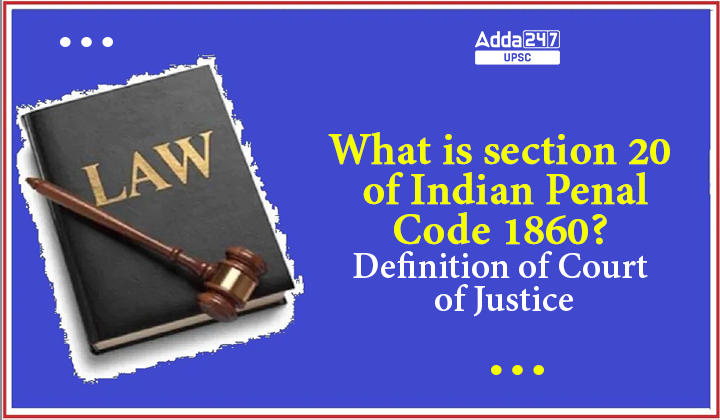Table of Contents
Section 20
Section 20 in India typically refers to Section 20 of the Indian Penal Code (IPC), which deals with the criminal liability of individuals for acts done by them while of unsound mind. This section plays a crucial role in determining whether a person can be held criminally responsible for their actions when they are mentally unsound or suffering from a mental disorder. Here is an explanation of Section 20 of the IPC in India.
Section 20 of Indian Penal Code
Section 20 of the Indian Penal Code (IPC) is a crucial legal provision that deals with the criminal liability of individuals who commit offenses while mentally incapacitated due to intoxication. It states that a person who commits an offense while intoxicated shall be treated as if they had not been intoxicated unless they voluntarily became intoxicated. This section essentially offers protection to individuals who, against their will, find themselves in a state of intoxication that impairs their ability to make sound judgments or understand the consequences of their actions.
However, it is important to note that if a person willingly consumes intoxicating substances and then commits an offense, Section 20 does not serve as a defense, and they may be held criminally responsible for their actions. This provision reflects the Indian legal system’s consideration for cases where individuals may be temporarily incapacitated due to involuntary intoxication, safeguarding their rights and mitigating criminal liability accordingly.
What is Section 20 of Indian Penal Code 1860?
- Section 20 of the Indian Penal Code, 1860 defines the term “Court of Justice”. It states that the words “Court of Justice” denote a judge who is empowered by law to act judicially alone, or a body of judges, which is empowered by law to act judicially as a body when such judge or body of judges is acting judicially.
- In other words, a “Court of Justice” is anybody who is authorized by law to hear and decide cases. This includes both single judges and benches of judges. The term also includes bodies that are not technically courts, such as panchayats that have been given the power to try and determine suits.
- The definition of “Court of Justice” is important because it is used in a number of other sections of the Indian Penal Code. For example, Section 194 of the IPC makes it an offence to “obstruct any person acting in the lawful discharge of his duty as a public servant”. This section would apply to someone who obstructed a judge or other judicial officer who was acting in their official capacity.
- Section 20 of the IPC is also important because it helps to define the scope of judicial immunity. Judicial officers are generally immune from civil and criminal liability for their actions in the course of their judicial duties. However, this immunity does not extend to cases where the judicial officer has acted in a way that is outside of their jurisdiction or has deliberately abused their powers.
- The definition of “Court of Justice” is a complex and evolving area of law. It is important to consult with an attorney if you have any questions about the scope of this definition or the implications of it for your case.
Definition of “Court of Justice”
- The words “Court of Justice” denote a Judge who is empowered by law to act judicially alone, or a body of Judges who is empowered by law to act judicially as a body, when such Judge or body of Judges is acting judicially.
- This definition is found in Section 20 of the Indian Penal Code, 1860. It means that a “Court of Justice” is anybody who is authorized by law to hear and decide cases. This includes both single judges and benches of judges. The term also includes bodies that are not technically courts, such as panchayats that have been given the power to try and determine suits.
- The definition of “Court of Justice” in India is important because it is used in a number of other laws, such as the Code of Criminal Procedure, 1973 and the Civil Procedure Code, 1908. These laws specify the powers and procedures of courts, and the definition of “Court of Justice” helps to clarify who is covered by these laws.
- The definition of “Court of Justice” is also important because it helps to define the scope of judicial immunity. Judicial officers are generally immune from civil and criminal liability for their actions in the course of their judicial duties. However, this immunity does not extend to cases where the judicial officer has acted in a way that is outside of their jurisdiction or has deliberately abused their powers.
- The definition of “Court of Justice” in India is a complex and evolving area of law. It is important to consult with an attorney if you have any questions about the scope of this definition or the implications of it for your case.
Here are some examples of courts of justice in India:
- The Supreme Court of India
- The High Courts
- The District Courts
- The Family Courts
- The Labour Courts
- The Consumer Courts
- The Tax Courts
- The Tribunals
These courts are responsible for hearing and deciding a wide variety of cases, including criminal cases, civil cases, and family cases. They also play an important role in interpreting and applying the law. The courts of justice in India are an important part of the country’s legal system. They play a vital role in ensuring that justice is served and that the rule of law is upheld.
Jurisdiction of “Court of Justice”
- The Supreme Court of India: The Supreme Court is the highest court in India and has original, appellate, and advisory jurisdiction. Its original jurisdiction extends to a limited number of cases, such as disputes between the central government and a state government. Its appellate jurisdiction covers a wide range of cases, including criminal cases, civil cases, and constitutional cases. Its advisory jurisdiction allows the President of India to seek the Court’s opinion on a legal matter.
- The High Courts: The High Courts are the highest courts in each state and union territory of India. They have original jurisdiction over a limited number of cases, such as writ petitions challenging the constitutionality of laws or government actions. They also have appellate jurisdiction over cases decided by lower courts in their respective states or union territories.
- The District Courts: The District Courts are the trial courts in India. They have original jurisdiction over most criminal cases and civil cases.
- The Family Courts: The Family Courts are specialized courts that deal with family law matters, such as divorce, child custody, and alimony.
- The Labour Courts: The Labour Courts are specialized courts that deal with labor law matters, such as wage disputes, unfair dismissal, and industrial disputes.
- The Consumer Courts: The Consumer Courts are specialized courts that deal with consumer protection matters, such as defective products, misleading advertising, and unfair trade practices.
- The Tax Courts: The Tax Courts are specialized courts that deal with tax law matters, such as income tax disputes and customs duty disputes.
- The Tribunals: Tribunals are specialized bodies that are set up to deal with specific types of cases, such as environmental disputes or telecom disputes.
The jurisdiction of each court is determined by the Constitution of India, as well as by other laws. The jurisdiction of a court may also be changed by the legislature. It is important to note that the jurisdiction of a court is not always clear-cut. In some cases, there may be a conflict between the jurisdiction of two or more courts. In these cases, the court that has the higher jurisdiction will have the authority to hear the case.
Powers of “Court of Justice”
The powers of a Court of Justice in India encompass adjudicating disputes, interpreting and applying the law, judicial review, protecting fundamental rights, appellate jurisdiction, dealing with contempt of court, summoning witnesses, enforcing judgments, promoting alternative dispute resolution, and playing a role in appointing and transferring judges within the judiciary. These powers are vital to ensure the rule of law, protect citizens’ rights, and maintain the integrity of the Indian legal system. The specific powers and jurisdiction of each court in India are defined by the Constitution and relevant laws, contributing to a well-structured and independent judiciary.
Limitations on the Powers of a “Court of Justice”
Limitations on the powers of a Court of Justice in India include the principles of separation of powers, judicial self-restraint in policy matters, legislative supremacy, defined jurisdiction, adherence to legal precedent, potential for judicial overreach, vulnerability to constitutional amendments, accountability to public opinion, enforcement challenges, and administrative constraints. These constraints are essential to uphold democracy, maintain checks and balances, and prevent an excessive concentration of power within the judiciary.
| Relatable Articles | |
| Section 10 of Income Tax Act | Section 11 |
| Special Provisions Act | Cooperative Societies |
| Section 2 | Indian Penal Code |



 TSPSC Group 1 Question Paper 2024, Downl...
TSPSC Group 1 Question Paper 2024, Downl...
 TSPSC Group 1 Answer key 2024 Out, Downl...
TSPSC Group 1 Answer key 2024 Out, Downl...
 Cabinet Ministers of India 2024, New Cab...
Cabinet Ministers of India 2024, New Cab...







